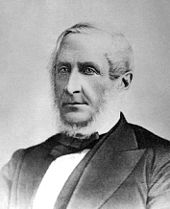Edward Palmer (politician)
Edward Palmer , QC (born September 1, 1809 in Charlottetown , Prince Edward Island , † November 3, 1889 ibid) was a Canadian politician and judge . From 1859 to 1863 he was Prime Minister of the British Crown Colony Prince Edward Island. He is considered one of the fathers of the Confederation and thus a pioneer of the Canadian state founded in 1867, although he had spoken out against the merger.
biography
Edward Palmer was the son of James Bardin Palmer, an Irish lawyer and politician. After primary school he worked as an employee in his father's office. In 1830 he was admitted to the bar (law faculties did not yet exist at the time). Like his father before him, he also worked as an estate manager on behalf of large landowners who did not live on the island . He bought considerable property himself, until he sold it in 1870 after many years of disputes with his tenants.
In 1835 Palmer was elected to the Legislative Assembly of Prince Edward Island and within a few years established himself as one of the most important Conservatives. He was considered a staunch guardian of the political and social conditions of the time. In particular, he opposed the introduction of self-government , the unification of the colonies in British North America , universal suffrage and land reforms . From 1842 to 1847 Palmer was a member of the Executive Council appointed by the British government. From 1848 he was Minister of Justice, but gave up this office three years later when self-government was introduced and the liberal reformers around George Coles came to power.
From 1849, Palmer led the conservative parliamentary group. He often had verbal arguments with Coles and Edward Whelan ; In 1851 he fought against the former in a bloodless duel . In 1853 the Conservatives won the elections. The House of Lords John Holl formed the government and appointed Palmer Attorney General . But after just under a year, Lieutenant Governor Alexander Bannerman ordered new elections that ended with a victory for the Liberals. In 1859, Palmer led the Conservatives to a clear election victory and assumed the office of Prime Minister. A week after the elections of 1863 a government crisis broke out and John Hamilton Gray became the new head of government, while the disempowered Palmer remained in government as Attorney General for the time being.
In contrast to Gray, Palmer was firmly against the proposed Canadian Confederation . Although he was present at the Charlottetown Conference and the Québec Conference in 1864 , his obstructionist policy ensured that Prince Edward Island did not join the new Canadian state three years later. Under James Colledge Pope , who served from 1865 to 1867, Palmer remained Attorney General. In 1869 he rejected the "better conditions" offered by Canada, instead advocating a free trade agreement with the United States .
In April 1872 Palmer went over to the Liberals, as the new Prime Minister Robert Haythorne also firmly opposed the Confederation. When the construction of the Prince Edward Island Railway nearly drove the colony to financial ruin, the government had no choice but to accept the conditions of membership and become a Canadian province on July 1, 1873. With that, Palmer's political career ended. Canadian Prime Minister Alexander Mackenzie appointed him chairman of the Prince Edward Island Supreme Court in 1874. He held this office until his death.
Web links
- Edward Palmer . In: Dictionary of Canadian Biography . 24 volumes, 1966–2018. University of Toronto Press, Toronto ( English , French ).
- Short biography on the website of the provincial government (English)
| personal data | |
|---|---|
| SURNAME | Palmer, Edward |
| BRIEF DESCRIPTION | Canadian politician |
| DATE OF BIRTH | September 1, 1809 |
| PLACE OF BIRTH | Charlottetown , Prince Edward Island |
| DATE OF DEATH | November 3, 1889 |
| Place of death | Charlottetown , Prince Edward Island |

